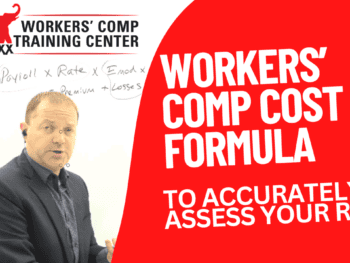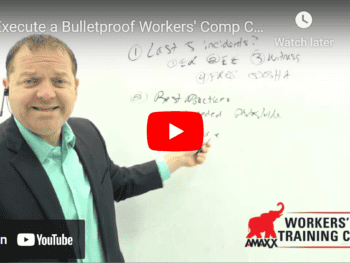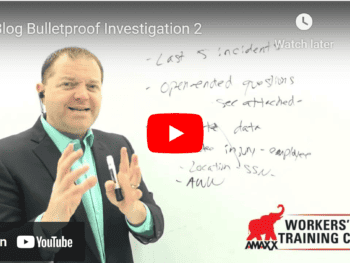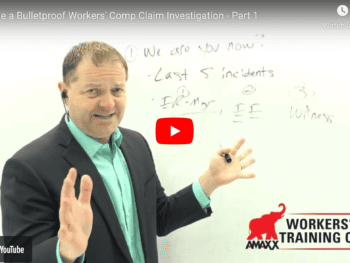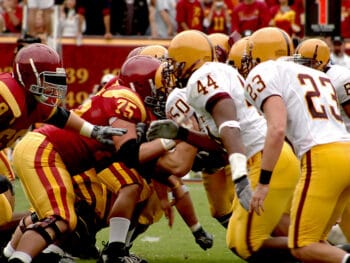Over the last few years, more attention has been given to the seriousness of head injuries. These types of trauma are often referred to as “traumatic brain injuries,” which can result in serious consequences if not properly investigated.
What is a TBI?
A traumatic brain injury (TBI) involves an event that causes change in the structure or metabolism of the brain. Previously these types of injuries were referred to as “organic brain syndrome.”
TBI’s occur in a number of different ways. The most common TBI is the result of a worker striking their head against an object. It can also result from a slip/fall that results in the head making contact with a surface or via “whip lash.” They can also occur after being exposed to chemicals or gases, such as carbon monoxide in the work environment.
Click Link to Access Free PDF Download
“13 Research Studies to Prove Value of Return-to-Work Program & Gain Stakeholder Buy-In”
How Can You Identify a TBI?
Unlike a broken bone, bruising or burns, TBIs are often not evident when looking at a person suffering from this condition. While every worker who suffers a blow to their head should be immediately treated by a trained medical professional, it is essential to observe them for other symptoms that develop shortly afterward. These symptoms include:
- Physical deficits and motor skill operations;
- Cognitive problems or dysfunction; and
- Issues with strength and balance.
Exposure to a TBI may also impact a person from a psychological perspective.
Successfully Investigating a TBI Incident
A comprehensive post-injury investigation is essential for any claim involving a TBI or injury to one’s head. This investigation should include the following components:
- Specific information concerning the mechanism of injury and areas where impact was made on the person’s head. If the TBI involves a workplace exposure to chemicals, it is important to include this information.
- Identification of all witnesses. This includes not only people who witnessed the incident or exposure, but those who have knowledge of the employee’s behaviors before and after the incident.
- Obtain all medical records related to the incident and care provided immediately after the incident. It is also important to obtain a history of any and all psychological treatment and care before and after the occurrence of the TBI.
Management of a TBI Claim
Managing a complex workers’ compensation case that involves a TBI will require additional steps beyond the standard best practices. In addition to an independent medical examination, the use of other specialists may be important to defend successfully these claims. It is important to check with the requirements of the applicable workers’ compensation act and an attorney concentrating their practice in this area before scheduling any evaluation.
- Neurological Evaluation: This type of examination is conducted by a neurologist and will pay particular attention to CT and MRI scans. The neurologist will help explain the significance of any findings and provide an expert opinion as to causation.
- Neuropsychological Evaluation: This type of evaluation is performed by a neuropsychiatrist. It differs from a neurological evaluation in that this specialist will determine the existence of any brain dysfunctions. In addition to an oral examination, testing will also take place during the course of this examination and analysis will be provided.
A complete psychiatric evaluation and surveillance may also be required when defending these claims. Some claim management teams have developed specialized units to investigate and handle TBI cases.
Conclusions
TBIs require special claims handling practices from the onset of the claim. In addition to a complete investigation, it is essential to understand these injuries and employ specialized experts that can be used to successful mitigate future exposures.
Author Michael B. Stack, CPA, Principal, Amaxx Risk Solutions, Inc. He is an expert in employer communication systems and helps employers reduce their workers comp costs by 20% to 50%. He resides in the Boston area and works as a Qualified Loss Management Program provider working with high experience modification factor companies in the Massachusetts State Risk Pool. He is co-author of the #1 selling book on cost containment, Your Ultimate Guide To Mastering Workers Comp Costs www.reduceyourworkerscomp.com. Contact: mstack@reduceyourworkerscomp.com.
©2015 Amaxx Risk Solutions, Inc. All rights reserved under International Copyright Law.
SALES TO PAY FOR ACCIDENTS CALCULATOR: http://reduceyourworkerscomp.com/sales-to-pay-for-accidents-calculator/
WC GROUP: http://www.linkedin.com/groups?homeNewMember=&gid=1922050/
Do not use this information without independent verification. All state laws vary. You should consult with your insurance broker, attorney, or qualified professional.



